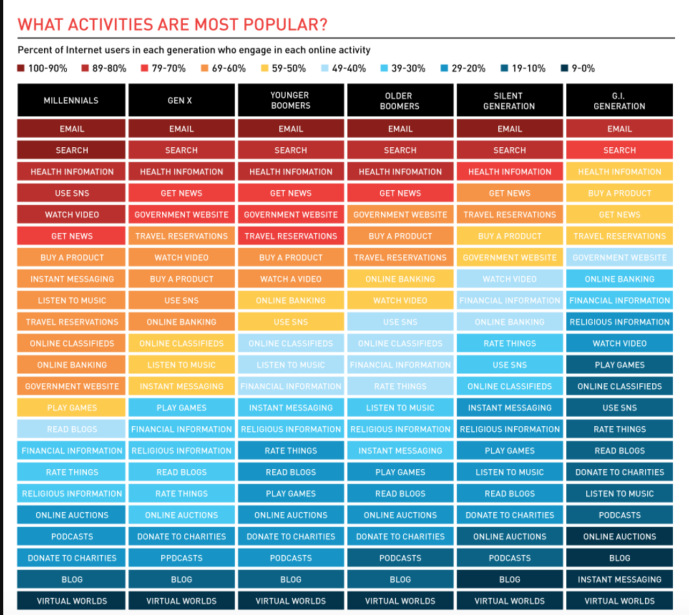In this digital age, it is more shocking to know if one does not have access to web in a well-developed country. Every user access the web for various reasons and your personal values create the “digital differences” of your online behaviour.
This infographic illustrated how people from the different generations on how they use the web (Sitejabber, 2011).

According to this infographic, the first three online activities are the same across all generations but using social media is the fourth popular activity for millennials compared to the majority getting news.
I would rank my first 8 activities in this order:
- Search
- Use SNS
- Get news
- Instant messaging
- Watch videos
- Listen to music
- Buy a product
One’s digital behaviour is unique as it could be because it is based on his personal values and beliefs (Halford et. al., 2017). I used the web for mainly knowledge-based purposes such as for academic or getting news. Even while surfing through social media, I would keep an extra lookout for current news updates. Compared to someone who is constantly creating and posting original content on the web, I make lesser impact as a visitor than a resident.
Blessed with latest fibre broadband connection and devices, I have a stronger advantage over people who do not have access to these privileges. Massive Open Online Courses (MOOC) like Futurelearn and edX can provide professional help in my academic areas (Mooc-List.com, 2017). People who do not have access would not be able to know what is happening out of their area such as villages in India.
Tapping on my endless curiosity to know about the world’s latest happenings, my digital difference clearly makes a significant difference in my life; the way I look, experience and feel all aspects of life.
Please feel free to enlighten me with your wisdom on your digital difference compared to mine.
(307 words)
Cheers,
Jocelyn Goh
Sources:
Halford, S., Davies, H., & Dixon, J. (2017). Page from Learning in the Network Age – University of Southampton. FutureLearn. Retrieved from https://www.futurelearn.com/courses/learning-network-age/3/steps/263012
MOOC List. (2017). MOOC List. Retrieved from https://www.mooc-list.com/
SiteJabber. (2011). Retrieved from https://www.sitejabber.com/resources/wp-content/uploads/2011/01/sjgen.png
Zickuhr, K., & Smith, A. (2012). Cite a Website – Cite This For Me. Pewinternet.org. Retrieved 10 November 2017, from http://www.pewinternet.org/files/old-media/Files/Reports/2012/PIP_Digital_differences_041312.pdf

You must be logged in to post a comment.